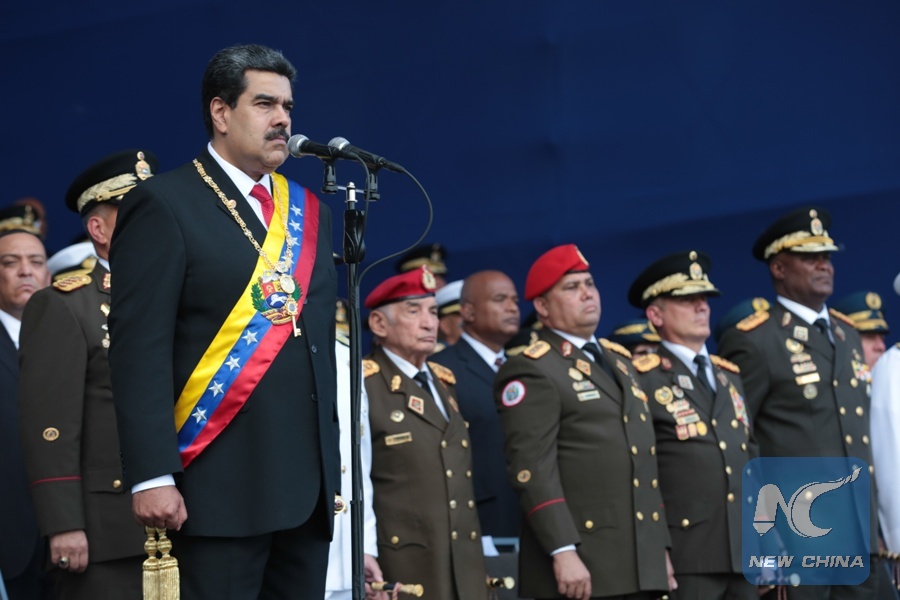
File Photo: Venezuelan President Nicolas Maduro (front) inspects the armed forces after the presidential inauguration ceremony in Caracas, Venezuela, on Jan. 10, 2019. (Xinhua)
WASHINGTON, Feb. 6 (Xinhua) -- Washington has stepped up diplomatic maneuver on the situation in Venezuela weeks after it recognized opposition leader Juan Guaido as the nation's "interim president" and slapped sanctions on Venezuelan state oil company PDVSA to cut off Caracas's vital source of revenue.
U.S. National Security Adviser John Bolton tweeted Wednesday that he had just met with Colombian Foreign Minister Carlos Holmes Trujillo at the White House and they "discussed pressing issues, including joint efforts to provide humanitarian aid to the Venezuelan people, as well as counter-terrorism collaboration."
Earlier on Tuesday, Bolton met with visiting Brazilian Foreign Minister Ernesto Araujo to discuss "mutual support for Venezuela's Interim President Guaido, including logistics for providing humanitarian assistance for the Venezuelan people."
According to a statement issued on Wednesday by the State Department's deputy spokesperson Robert Palladino, U.S. Secretary of State Mike Pompeo earlier met with French Foreign Minister Jean-Yves Le Drian to discuss issues like Venezuela, Iran and Russia.
Also on the same day, Pompeo claimed on Twitter that the Venezuelan military "under Maduro's orders is blocking aid with trucks and shipping tankers."
In addition, a statement issued later by the White House on Wednesday said that President Donald Trump will welcome his Colombian counterpart Ivan Duque to the White House on Feb. 13 when the two leaders will discuss "strategic partnerships in regional security, and efforts to restore democracy in Venezuela."
Trump has also warned that "all options are on the table" regarding Venezuela.
At a news briefing in late January, Bolton accidentally turned to the media the face of a yellow pad that included a draft note showing a plan to send "5,000 troops to Colombia," stoking international fear about a U.S. military intervention on the Venezuela crisis.
On the other hand, the United Nations has appealed for negotiations.
"Serious political negotiations" are necessary for finding a solution to lasting peace in Venezuela, a spokesman for UN Secretary-General Antonio Guterres said Wednesday.
"When we see the present stand-off, it becomes even more clear that serious political negotiations between the parties are necessary to find a solution leading to lasting peace for the people of Venezuela," said Stephane Dujarric.
Meanwhile, Latin American countries are trying to broker a negotiated solution to the Venezuela political crisis.
Uruguay and Mexico on Wednesday unveiled a four-step proposal. First, creating conditions for direct contact between Venezuela's ruling socialist party and President Nicolas Maduro on the one hand and the opposition led by self-proclaimed interim president Juan Guaido on the other. That would be followed by a negotiation phase, a commitments phase, and a finally implementation phase.
Maduro won 2018 Venezuelan presidential election by garnering over 6 million votes, some 4 million more than his closest rival, and was inaugurated for a second term on Jan. 10.
Guaido, head of the Venezuelan National Assembly, declared himself interim president during an anti-government rally on Jan. 23, a move which was immediately recognized by the United States.
Maduro accused Washington of orchestrating an operation to impose, through a coup d'etat, a puppet regime in Venezuela.

